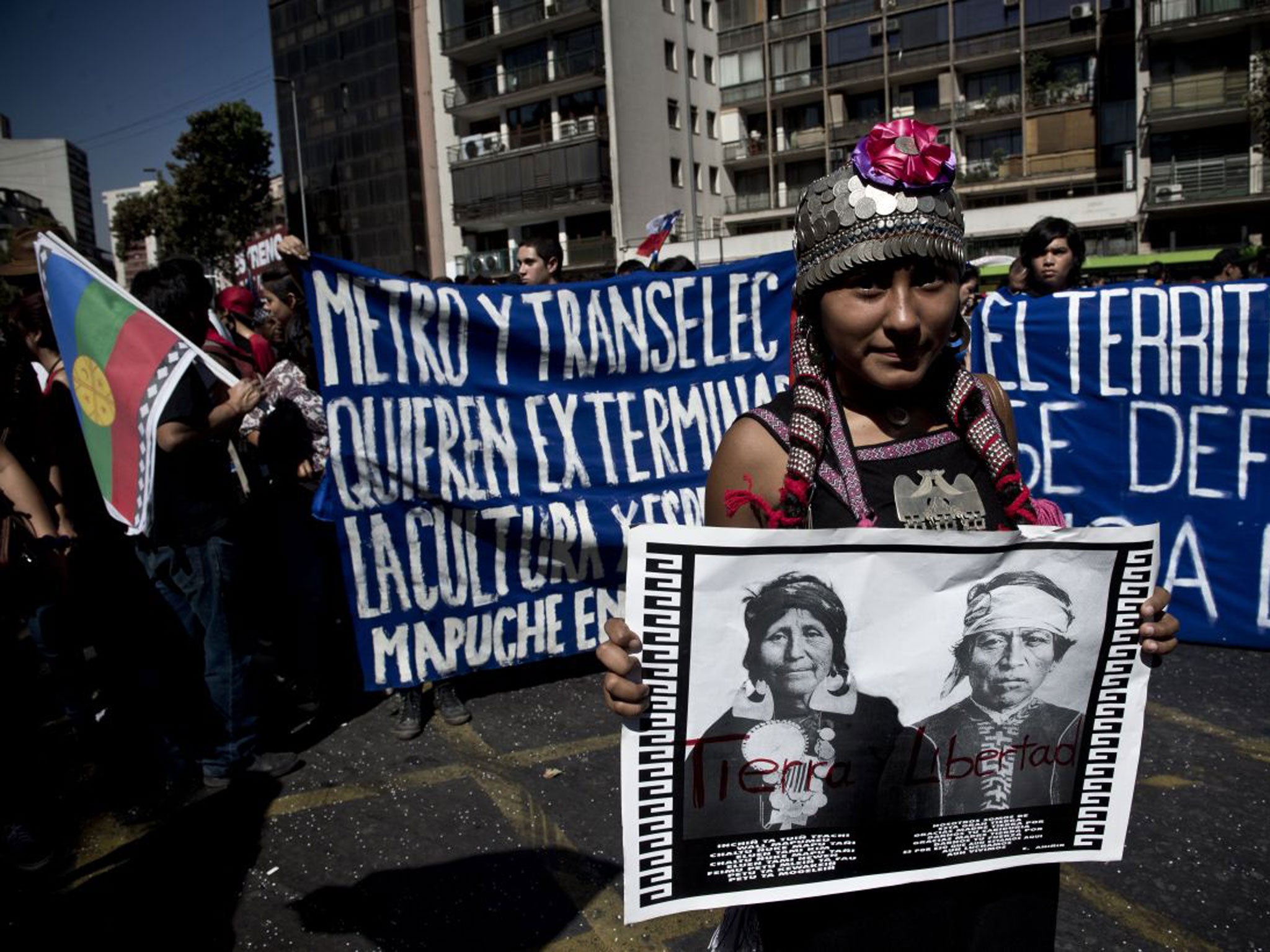Chile’s farmers living in fear as Mapuche go to war over ancestral lands

The Mapuche warriors of southern Chile were so fierce, they conquered the conquistadors, driving out the Spanish invaders in the 1600s. Today, the indigenous population are at war again, taking back ancestral land one farmhouse at a time.
“They broke in and put a shotgun to my 70-year-old mother’s head,” claims Rudy Hernan, recalling the night he says a dozen masked men drove his family off their 50-acre farm. “They say the land belongs to them, but I thought this was Chile,” he said. “Aren’t we all Chilean?”
His question is at the heart of what is known as the Mapuche conflict, which has become Chile’s open wound.
The number of Chileans who identify as Mapuche has grown rapidly, accounting for nearly 10 per cent of the country’s 18 million inhabitants, although militant nationalists make up a much smaller share.
The worst of the violence has flared in southern Chile’s fertile Araucania region, alongside the rapid expansion of the paper-pulp industry. Vast pine and eucalyptus plantations blanket millions of acres, but unlike wheat, oats or other local crops, the tree farms provide relatively few jobs, as they require little maintenance. The cultivated trees are insatiably thirsty, absorbing far more groundwater than the local native forests they replaced.
Mapuche subsistence farmers, who often living on plots immediately downhill from the tree farms, saw their wells and springs go dry. “In the summer, there is no water,” said Mapuche activist Jose Quipal, 33.
After a four-year prison sentence for attacking timber company equipment, Mr Quipal joined other young Mapuches from their struggling village to commandeer the 1,400-acre farm of the landowner next door. He had earlier moved his wife and their two-year-old son into a one-room cabin on the property.
“We didn’t have a house of our own, or any land,” Quipal said. “But this land belongs to our people. It was taken from us, and we’re taking it back.”
One of the hottest flash points is Ercilla, a farming town 360 miles south of Chile’s capital, Santiago. It doesn’t quite feel like a war zone, but national police, wearing body armour, hunker down in makeshift command posts. Several Mapuche activists have been shot by police over the years. Others have been sent to prison.
By most accounts, tensions are higher now than perhaps at any time since the 1880s when the Chilean army marched in to subdue the Mapuche and complete the country’s territorial unification – with the Mapuche forcibly resettled on small tracts of land.
Faced with international and domestic criticism over the Mapuches’ historic plight, the Chilean government has been purchasing land and attempting to transfer it to the Mapuche. President Michelle Bachelet, who returned to office in March for a second term (she served as president from 2006 to 2010) appeared eager to ease tensions when she named a part-Mapuche politician, Francisco Huenchumilla, as her government’s top official in the region.
He promptly issued an apology on behalf of the Chilean government – to the Mapuche, for the seizure of their land, and also to the white Chileans who were settled there a century earlier, a process Mr Huenchumilla described in an interview as “a mistake”.
The Mapuche should get their land back, he said. “When my grandfather was born, we had 1,200 acres,” Mr Huenchumilla added. “I have two.”
Some Mapuche activists insist their goal is to reclaim land from big timber companies and commercial farms, not the humble small farmers who also came to populate the region over the years.
But Victor Queipul, 44, the community leader of Temucuicui, outside Ercilla, said the distinction did not matter. “The huinca are different,” he said, referring to non-Mapuche residents. “They have to leave.”
The government has stated repeatedly that it won’t buy land for Mapuches who illegally occupy farms and other property. But with so many Mapuche families needing land, properties are often divided into farms too small to provide a living.
Local businessman Brian Blackburn, whose company develops seed varieties on his family’s 3,400-acre farm, claims the government’s move to buy more land for the Mapuche has produced a cottage industry of fake claims and other abuses.
His great-great-grandfather, an immigrant from Britain, bought the land from the Chilean government after the Mapuche were driven off and resettled nearby. Today Mr Blackburn has 50 employees. Most of the workers are local Mapuches.
He, too, is under threat. Arsonists attacked his fields in January. The blaze charred 50 acres but turned into a cautionary lesson. As the fire spread across Mr Blackburn’s land, it suddenly reversed course and ended up scorching far more of the Mapuche-owned fields next door.
“It’s like any family,” Mr Blackburn said about living and working intimately with those whose ancestors were partly displaced by his own. “You have problems, but you have to go forward. You have to move on.”
© The Washington Post
Subscribe to Independent Premium to bookmark this article
Want to bookmark your favourite articles and stories to read or reference later? Start your Independent Premium subscription today.

Join our commenting forum
Join thought-provoking conversations, follow other Independent readers and see their replies